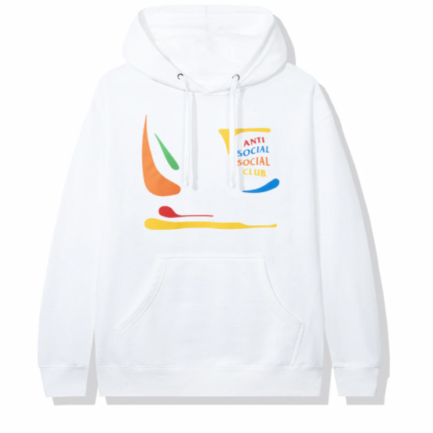In the ever-evolving landscape of the fashion industry, a new wave of consciousness is sweeping through the design and production processes. As consumers become increasingly aware of the environmental and ethical implications of their choices, the demand for sustainable and mindful fashion has surged. This shift is particularly evident in the realm of hoodies, where style meets a commitment to ethical practices. In this exploration, we delve into the world of mindful Anti Social Social Club fashion, focusing on the ethical considerations in the production of stylish hoodies.
The Rise of Mindful Consumerism:
The 21st century has witnessed a significant transformation in consumer behavior, with individuals more attuned to the impact of their choices. As fast fashion loses its luster, consumers are seeking alternatives that align with their values. The rise of mindful consumerism is reshaping the fashion landscape, emphasizing the need for transparency, sustainability, and ethical practices. On the contrary, the fusion of aesthetic appeal and ethical intent is an art form in itself. Stylish hoodies, crafted with a commitment to sustainability and social responsibility, become not just wardrobe staples but statements of conscious living.
Championing Sustainable Materials:
One of the key pillars of ethical fashion is the choice of materials. Stylish hoodies that embody mindful fashion often prioritize sustainable fabrics. Organic cotton, recycled polyester, and innovative materials like Tencel are gaining popularity as consumers gravitate towards eco-friendly options. These materials not only reduce the environmental footprint but also contribute to the overall comfort and quality of the hoodie. Ethical fashion brands are redefining the aesthetics of stylish hoodies, proving that sustainability and style can coexist seamlessly. From bold patterns inspired by nature to minimalist designs that stand the test of time, these hoodies become canvases for creative expression and ethical values.
Fair Labor Practices in Hoodie Production:
Ethical fashion extends beyond materials to encompass the entire production process. Mindful fashion brands are increasingly adopting fair labor practices, ensuring that the individuals involved in crafting stylish hoodies are treated ethically and compensated fairly. This commitment to social responsibility enhances the appeal of the hoodie, making it a symbol of not just style but also conscientious consumerism. Ethical fashion brands often collaborate with local artisans and communities, infusing cultural elements into the design process. This not only adds a unique touch to stylish hoodies but also empowers communities and preserves traditional craftsmanship.
Local Production and Its Impact:
Globalization has often meant that fashion production is outsourced to countries with lower labor costs, leading to ethical concerns regarding working conditions. However, a growing number of mindful fashion brands are opting for local production. This shift has multiple benefits, including the reduction of carbon emissions associated with transportation and the support of local economies. Stylish hoodies produced locally become not just a fashion statement but a testament to sustainable and ethical choices. Ethical fashion brands recognize the importance of educating consumers about the impact of their choices. From providing information on eco-friendly materials to showcasing the faces behind the craftsmanship, these brands empower consumers to make informed decisions when selecting their stylish hoodies.
Extending the Lifespan of Hoodies:
In the quest for sustainability, the concept of circular fashion has gained traction. This approach emphasizes the longevity of garments, encouraging consumers to view their hoodies as long-term investments rather than disposable items. Mindful fashion brands are designing hoodies with durability in mind, utilizing quality craftsmanship and timeless styles that transcend fleeting trends. Ethical fashion brands are embracing the concept of customization, allowing consumers to create their unique stylish hoodies. This not only reduces waste but also fosters a sense of individuality, challenging the homogeneity often associated with fast fashion.
Transparency and Accountability:
The journey towards ethical fashion requires transparency and accountability. Mindful fashion brands are increasingly opening up about their production processes, sharing insights into material sourcing, manufacturing, and the impact on local communities. This transparency not only builds trust with consumers but also fosters a sense of accountability within the fashion industry. Industry leaders are recognizing the importance of corporate responsibility and the role they play in shaping consumer behavior. By championing ethical production methods and sustainable initiatives, these corporations set a precedent for the entire fashion industry.
Educating Consumers on Mindful Fashion:
As the demand for ethical fashion grows, there is a parallel need for consumer education. Many individuals are still unaware of the environmental and social impact of their clothing choices. Mindful fashion brands are taking on the role of educators, providing information on the lifecycle of their products, the importance of ethical practices, and the positive impact consumers can make through their choices. From jeans to accessories, the principles of sustainability and ethical manufacturing are transforming the entire fashion landscape. Stylish hoodies, therefore, become emblematic of a broader movement towards a more conscious and responsible approach to clothing.
The Future of Mindful Fashion:
The journey towards a more ethical and sustainable fashion industry is an ongoing process. As technology advances, innovative solutions are emerging, from biodegradable fabrics to blockchain technology for supply chain transparency. However, challenges persist, including the need for widespread adoption of ethical practices and the balancing act of making sustainable fashion accessible and affordable for all. Balancing the economic viability of ethical practices with the growing demand for affordable fashion remains a hurdle. However, these challenges also present opportunities for innovation and collaboration. As technology evolves and consumer awareness deepens, the fashion industry has the chance to reinvent itself, creating a future where stylish hoodies are synonymous with ethical choices.
Conclusion:
In conclusion, the marriage of style and ethics in the production of hoodies represents a pivotal moment in the fashion industry. Mindful fashion is not merely a trend but a conscious choice that reflects a broader shift in consumer values. As stylish hoodies become ambassadors for ethical practices, they contribute to a more sustainable and responsible fashion ecosystem. The future of fashion lies in the hands of those who understand that looking good can also mean doing good for the planet and its inhabitants. As consumers embrace the art of mindful fashion, the industry responds by weaving together style, ethics, and innovation into the very fabric of our wardrobes. In this sartorial evolution, the hoodie becomes not just a garment but a testament to the transformative power of conscious choices in shaping the future of fashion.












